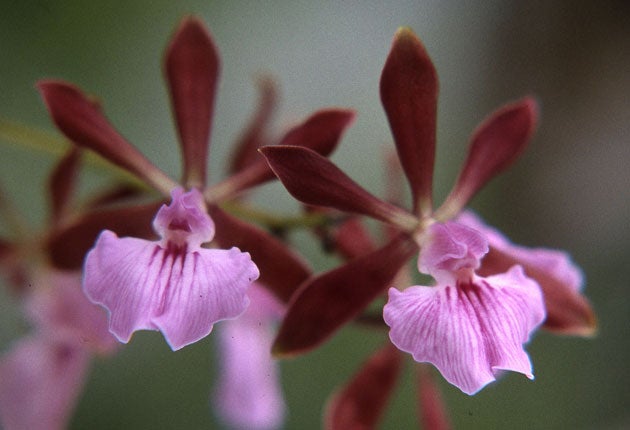Kew scientists lead fight to save orchids from extinction
Global team to freeze seeds from 2,000 species

Your support helps us to tell the story
From reproductive rights to climate change to Big Tech, The Independent is on the ground when the story is developing. Whether it's investigating the financials of Elon Musk's pro-Trump PAC or producing our latest documentary, 'The A Word', which shines a light on the American women fighting for reproductive rights, we know how important it is to parse out the facts from the messaging.
At such a critical moment in US history, we need reporters on the ground. Your donation allows us to keep sending journalists to speak to both sides of the story.
The Independent is trusted by Americans across the entire political spectrum. And unlike many other quality news outlets, we choose not to lock Americans out of our reporting and analysis with paywalls. We believe quality journalism should be available to everyone, paid for by those who can afford it.
Your support makes all the difference.British scientists are leading efforts to set up a network of orchid seed stores around the world in an attempt to conserve thousands of species of some of the world's most beautiful flowering plants.
A research team from London's Kew Gardens is co-ordinating the Orchid Seed Stores for Sustainable Use [Osssu] project, which will see scientists from dozens of countries contribute to a five-year, £2m programme to protect at least 2,000 orchid species by 2015.
Philip Seaton, the Osssu project manager, said the flowers provide an important warning of ecosystems in crisis: "Orchids are indicator species: if forests are in trouble then orchids will be one of the first things to go."
There are more than 20,000 orchid species, one in eight of the world's flowering plant species. About a quarter of these are at risk of extinction, according to Professor Hugh Pritchard, Osssu's project leader based at Kew's Millennium Seed Bank, in Wakehurst Place, Sussex. "This is about helping to establish a network of orchid seed banks around the world in an attempt to save the species," he said.
The project stems from a grant given by the British government in 2007 to develop seed banks in biodiversity hotspots in Latin America and Asia. Countries such as Ecuador, Brazil, Colombia, Cuba, China, Indonesia, Thailand and the Philippines have already agreed plans to conserve seeds. Even so, only around 250 species have been stored so far.
Their seeds are so tiny that a cluster of thousands can resemble a large pinch of dust. To protect them they will be dried and stored at 20C below zero in banks of freezers. These will keep them in suspended animation, allowing scientists to use them decades from now. Some shorter-lived orchid species will require storage in liquid nitrogen, at -196C.
The drive to protect thousands more species is an insurance policy against growing threats of deforestation and climate change, as well as the damage done by collectors digging plants up for profit.
And researchers will track the rates at which species germinate and grow, with seeds monitored for signs of deterioration and samples grown "in vitro" – on a nutrient-rich "goo" called Knudson C. There are also plans to also collect samples of the pollen and fungi that the individual species need to flower in the wild.
The Osssu network aims to grow to 30 countries, with India, the US, Italy, Canada, Kenya and Cameroon among those poised to come on board. The project will be showcased at the fourth annual International Orchid Conservation Congress, being held in the Czech Republic at the end of May.
Join our commenting forum
Join thought-provoking conversations, follow other Independent readers and see their replies
0Comments